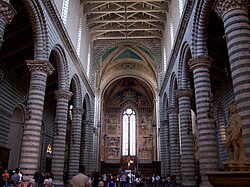| Years active | 12th to 15th century |
|---|---|
| Location | Italy |
Italian Gothic architecture (also called temperate Gothic architecture, has characteristics that distinguish it considerably from those of the place of origin of Gothic architecture, France, and from other European countries in which this language has spread (the United Kingdom, Germany and Spain).[1]
Italian architects preferred to keep the traditional construction methods established in the previous centuries, and architectural solutions and technical innovations of French Gothic architecture were seldom used. A soaring height was less important than in Northern Europe. Brick, rather than stone, was in many areas the most common building material, and marble was widely used for decoration.[2] In the 15th century, when the Gothic style dominated both Northern Europe and the Italian Peninsula, Northern Italy became the birthplace of Renaissance architecture.[1]
- ^ a b Watkin 1986, pp. 166–67.
- ^ Encyclopaedia Britannica, "Western Architecture, Italian Gothic" (retrieved August 28, 2020)


